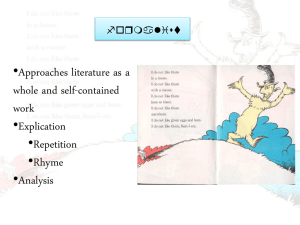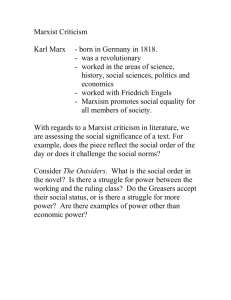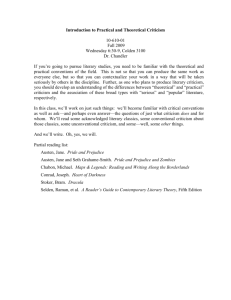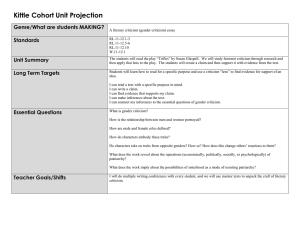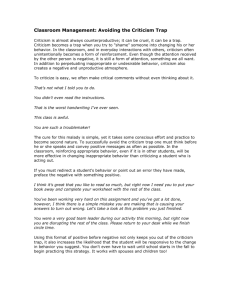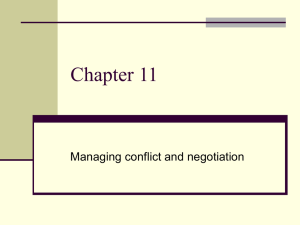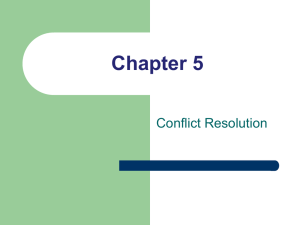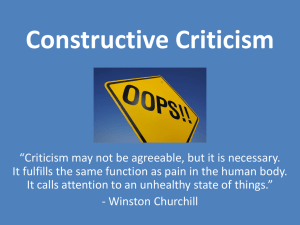My favorite assignment
advertisement
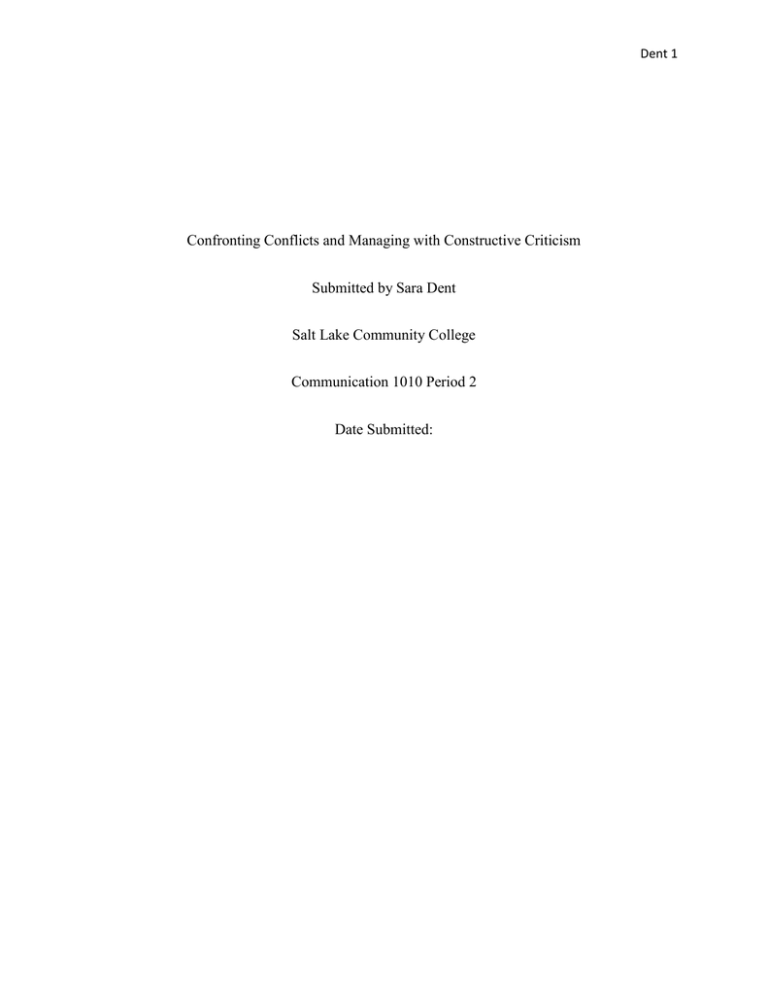
Dent 1 Confronting Conflicts and Managing with Constructive Criticism Submitted by Sara Dent Salt Lake Community College Communication 1010 Period 2 Date Submitted: Dent 2 Overview: Communication plays an extremely large part of how we live our lives. Because of this, when communication is lacking an essential element, the results are apparent. Despite my overall confidence in the way I communicate, I have found many aspects of my communication skills in which I would like to improve. One of the most prevalent fallacies I’ve found in my communication is the lack of ability to give, and in some cases receive, constructive criticism as well as managing conflicts. Essentially I have a hard time communicating when hard situations arise. Description of the Problem: I have found that I have a difficult time bringing up sensitive topics and communicating about negative situations at hand. I feel like when I bring up these topics with someone that I will be seen as personally offend them rather than trying to fix the situation. In the book, Communicating at Work: Strategies for Success in Business and the Professions, it says, “Communicating about issues can be difficult because your message may seem like an attack on the person whose behavior is causing a problem” (Alder, Elmohorst, & Lucas, p. 113). For example, I am planning on attending Utah State University and rooming with my best friend Holly. I have been fortunate enough to have received multiple scholarships at USU. Holly hasn’t been as fortunate and because of that she doesn’t think her family can afford the housing that we both decided on living in. I heard about this through my mother and wanted to confront Holly with the situation, but I felt that if I was to bring it up, I would be offending her because of her lack of finances. Instead of confronting her the moment I heard of the situation, I waited until she Dent 3 brought up the difficult topic at a later time. I then learned that she had committed to being my roommate no matter where we lived. Because of my hesitation to confront the situation, I had unnecessarily worried about the situation for numerous weeks. Another aspect of confronting conflicts I have a particular tough time at is criticism, both delivering and receiving it. Again, I am worried that I will offend the receiver when delivering a complaint. The text says, “In the real world of work, criticism is a fact of life. Sometimes you have to deliver a complaint, and other times you are on the receiving end of others’ gripes. Either way, criticism can start a cycle of defensiveness that pollutes the communication climate between people or working groups,” (p. 116). For example, in my Concurrent class, English 1010 and Writing, the curriculum is heavily based on peer reviews of papers. Because of this, when we are finished with a draft of our papers, we switch papers and have our peers edit them. I have difficulties with this task. First of all, despite my adequacy at editing papers, I hesitate to edit because I feel like I am being mean or harsh by criticizing their work. Secondly, after receiving my edited paper, I get defensive and upset at the edits and suggestions made by my peers. According to Zen Habits, in regards to responding to criticism, “Often people will respond to criticism with anger. They’ll lash out, attack, become defensive and aggressive” (Babuata, 2011). Although I don’t lash out or attack my fellow peers for their innocent edits, I do become defensive and unwilling to revise my essay. My inability to give and receive constructive criticism has a harmful impact on how I communicate at school, work, and at home. Resources and Constraints: After recognizing my problem, I have found many resources that could help me improve my ability to confront difficult situations and give/receive constructive criticism. One of the most Dent 4 helpful resources I’ve found is simply this class, Communications 1010. This class has offered me many resources including documents, videos, and class discussions that better improve my communication. The biggest resource found in this class is the text book, Communication at Work: Strategies for Success in Business and the Professions. Another resource I have available is my father. My father is the Human Resources Manager of 10 Intermountain Health Care Hospitals in Utah and Idaho; therefore, he is quite experienced in confronting conflicts and delivering/receiving constructive criticism. Whenever a situation arises, I know that I can go to my father for experienced advice. I have recognized some constraints that might impede me from progressing in improving my communication habits, one of them includes is my unwillingness to do so. I need to get out of my comfort zone to change my habits for the better. Another constraint I acknowledge is my schedule. I am a full time student, captain of my school’s tennis team, and Vice President of my Peer Leadership Team with a part-time job working at the Larry H. Miller Megaplex Movie Theater. My ability to put time and effort into this project will likely be curtailed because of these contraints. Recommendations: After reviewing my resources, I have found many recommendations on how to improve my ability to confront conflict. In the text, psychologist Jack Gibb intentified six different kinds of message that evoke defensiveness when confronting conflict, and six alternative approaches that get a more positive response. Gibb suggests that when confronting conflict, use “I” language rather than “You” language. In regards to my best friend Holly possibly not rooming with me at college, instead of saying “You are leaving me and are going to room with someone else”, I Dent 5 could say, “I feel like you are leaving me because you want to room with someone else.” The text says that, “Statements like these show it’s possible to be nonjudgmental and still say what you want without landing any verbal punches,” (p. 114). Another recommendation is to be honest with your feelings or the situation. Honesty is less likely to produce defensiveness, even if what you say might offend them. Roger Fisher and Scott Brown explain this by stating, “If one statement of mine in a hundred is false, you may choose not to rely on me at all. Unless you can develop a theory of when I am honest and when I am not, your discovery of a small dishonesty will cast doubt over everything I say and do,” (Fisher & and Brown, 1998). Being upfront and honest with conflicts will build trust and prevent defensiveness and offensiveness in the receiver.

